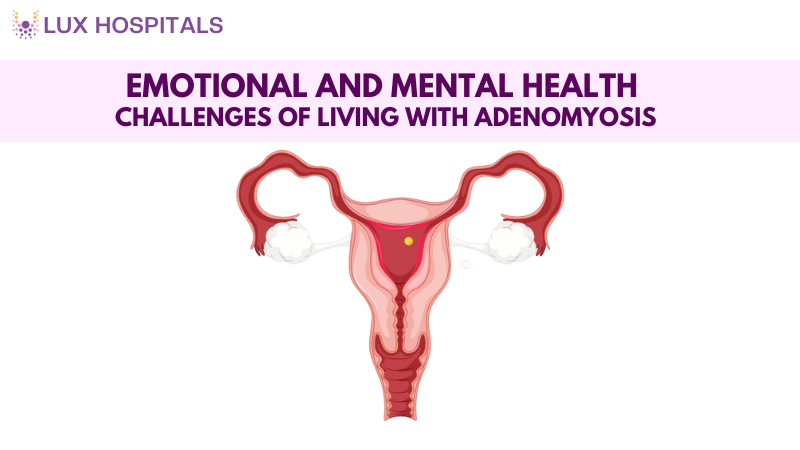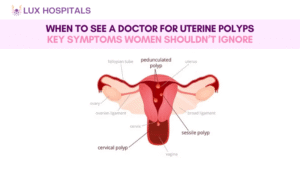How Stress Affects Your Ovarian Health?

Stress has become an inevitable aspect of contemporary life. However, it can negatively impact your reproductive system if it lasts too long. Understanding how stress affects ovarian health enables women to recognize early symptoms and maintain their hormonal balance. Maintaining mental well-being is just as important as physical health for proper ovarian function. Prolonged stress can silently interfere with your body’s natural hormonal rhythm, leading to irregular periods, fertility issues, and mood changes. It doesn’t just affect your mind—it directly influences your ovaries and menstrual cycle
Ways Stress Affects Ovarian Health and How to Manage It?
Understanding how stress affects ovarian health is crucial for women’s reproductive wellness. Prolonged stress interferes with ovulation, menstrual periods, and hormonal function. The following is a list of the primary ways that stress impacts ovarian health, along with simple techniques to protect your reproductive health.
1. Disrupts Hormonal Balance
One of the primary ways stress affects ovarian health is through hormone imbalance.
- Cortisol, the stress hormone, is released in response to stress.
- Excess cortisol interferes with estrogen and progesterone levels.
- This disruption can cause delayed or suppressed ovulation.
When hormones fluctuate, your menstrual cycle becomes unpredictable, making conception harder and increasing mood swings or fatigue.
2. Causes Irregular Menstrual Cycles
When stress affects ovarian health, it often appears first as irregular or missed periods.
- The hypothalamus (the brain’s hormone control centre) becomes confused by stress signals.
- It reduces the release of reproductive hormones.
- This can result in skipped, delayed, or shorter menstrual cycles.
Women who experience chronic anxiety or burnout often notice unpredictable menstruation patterns.
3. Interferes with Ovulation and Fertility
One of the most significant ways stress affects ovarian health is by impacting fertility.
- Elevated stress hormones suppress ovulation.
- Eggs may not be released properly.
- It can reduce the chances of conception and increase the risk of infertility.
Lifestyle stress — such as long work hours, emotional strain, or lack of rest — can delay ovulation and make pregnancy planning difficult.
4. Worsens Polycystic Ovary Syndrome (PCOS)
For women with PCOS, chronic stress affects ovarian health more severely.
- Stress heightens insulin resistance.
- It raises androgen (male hormone) levels.
- This exacerbates symptoms such as acne, irregular menstrual periods, and excessive hair growth.
A balanced diet, yoga, and stress-reduction practices can all help naturally improve PCOS treatment.
5. Impacts Emotional and Mental Well-Being
Stress’s impact on ovarian health is significantly influenced by emotional well-being.
- Stress leads to anxiety, fatigue, and even depression.
- Emotional distress triggers inflammation that can damage ovarian cells.
- This weakens the ovaries’ ability to produce healthy eggs.
Mental wellness support is as essential as medical treatment for long-term reproductive balance.
6. Reduces Egg Quality and Ovarian Reserve
Few women realize that stress affects ovarian health by harming egg quality.
- Prolonged cortisol exposure increases oxidative damage.
- It may affect egg DNA and lower ovarian reserve.
- Fertility potential decreases with sustained stress.
Stress’s adverse effects on ovarian health can be made worse by specific everyday routines. Typical triggers consist of:
7. Lifestyle Habits That Intensify Stress Effects
Certain daily habits can exacerbate the impact of stress on ovarian health. Common triggers include:
- Sleep deprivation raises cortisol levels.
- Caffeine and alcohol disrupt hormone metabolism.
- A poor diet affects insulin and reproductive hormones.
- Sedentary lifestyle – increases stress buildup.
8. Effective Stress Management Techniques
To reduce how stress affects ovarian health, try simple, holistic stress-relief methods:
- Mindfulness and meditation: Calm your nervous system.
- Regular exercise: Stabilises hormones naturally.
- Adequate sleep: Restores body functions.
- Social support: Sharing with loved ones reduces emotional tension.
Creating a personalised stress management plan tailored to your lifestyle can help maintain long-term hormonal balance.
9. When to Seek Medical Help
Sometimes stress affects ovarian health so deeply that professional help becomes essential.
Seek medical attention if you experience:
- Persistent irregular periods.
- Difficulty conceiving.
- Sudden changes in weight or mood.
- Hair loss and acne are often associated with hormonal fluctuations.
Early diagnosis helps restore hormonal balance and protects reproductive health.
10. The Role of Professional Support and Counselling
When stress affects ovarian health, emotional counselling and medical support can make recovery faster.
- Therapists can teach coping techniques.
- Support groups help you feel understood and less isolated.
- Gynaecologists ensure that hormonal imbalances are appropriately managed.
Combining emotional and medical care brings the best results for both mind and body.
Conclusion
Knowing how stress impacts ovarian health enables women to take control of their mental and reproductive health. Stress can affect all aspects of ovarian function, from hormonal imbalance to problems with fertility. Lux Hospitals promotes holistic care for women, emphasising timely medical advice, healthy lifestyle choices, and emotional well-being. Effective stress management is crucial for safeguarding your ovarian health and maintaining a balanced, healthy life. Visit Lux Hospitals for expert care and advice on maintaining your ovarian and reproductive health.
Frequently Asked Questions
Yes, stress can cause irregular or missed periods by interfering with the brain's hormone regulation. The imbalance between progesterone and estrogen causes menstrual cycles to be abbreviated, delayed, or skipped.
Yes. Stress can reduce egg quality and suppress ovulation when it impacts ovarian health. This hormonal imbalance delays conception and lowers fertility.
Yes. Stress increases insulin resistance and androgens, aggravating PCOS symptoms such as acne, hair growth, and weight gain. Managing stress helps control these effects.
You can manage stress through mindfulness, exercise, and deep breathing. Getting 7 to 8 hours of sleep and maintaining a balanced diet daily also supports hormonal balance.
Yes, in extreme circumstances. Prolonged stress causes oxidative damage and inflammation, which eventually lowers ovarian reserve and impairs egg quality. This can be avoided with early management.




















